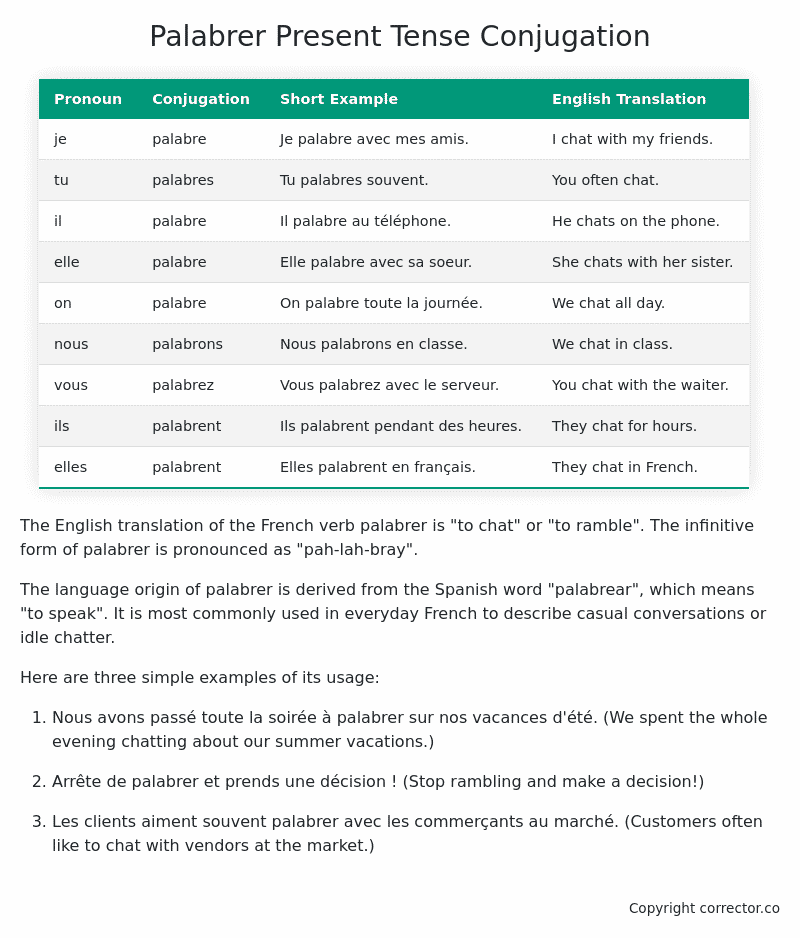Le Present (Present Tense) Conjugation of the French Verb palabrer
Introduction to the verb palabrer
The English translation of the French verb palabrer is “to chat” or “to ramble”. The infinitive form of palabrer is pronounced as “pah-lah-bray”.
The language origin of palabrer is derived from the Spanish word “palabrear”, which means “to speak”. It is most commonly used in everyday French to describe casual conversations or idle chatter.
Here are three simple examples of its usage:
-
Nous avons passé toute la soirée à palabrer sur nos vacances d’été. (We spent the whole evening chatting about our summer vacations.)
-
Arrête de palabrer et prends une décision ! (Stop rambling and make a decision!)
-
Les clients aiment souvent palabrer avec les commerçants au marché. (Customers often like to chat with vendors at the market.)
Palabrer – About the French Present Tense
To take a deep dive into all the French tenses then see our article on Mastering French Tense Conjugation.
Common Everyday Usage Patterns For Le Present
Interactions with Other Tenses
Table of the Present Tense Conjugation of palabrer
| Pronoun | Conjugation | Short Example | English Translation |
|---|---|---|---|
| je | palabre | Je palabre avec mes amis. | I chat with my friends. |
| tu | palabres | Tu palabres souvent. | You often chat. |
| il | palabre | Il palabre au téléphone. | He chats on the phone. |
| elle | palabre | Elle palabre avec sa soeur. | She chats with her sister. |
| on | palabre | On palabre toute la journée. | We chat all day. |
| nous | palabrons | Nous palabrons en classe. | We chat in class. |
| vous | palabrez | Vous palabrez avec le serveur. | You chat with the waiter. |
| ils | palabrent | Ils palabrent pendant des heures. | They chat for hours. |
| elles | palabrent | Elles palabrent en français. | They chat in French. |
Other Conjugations for Palabrer.
Le Present (Present Tense) Conjugation of the French Verb palabrer (this article)
Imparfait (Imperfect) Tense Conjugation of the French Verb palabrer
Passé Simple (Simple Past) Tense Conjugation of the French Verb palabrer
Passé Composé (Present Perfect) Tense Conjugation of the French Verb palabrer
Futur Simple (Simple Future) Tense Conjugation of the French Verb palabrer
Futur Proche (Near Future) Tense Conjugation of the French Verb palabrer
Plus-que-parfait (Pluperfect) Tense Conjugation of the French Verb palabrer
Passé Antérieur (Past Anterior) Tense Conjugation of the French Verb palabrer
Futur Antérieur (Future Anterior) Tense Conjugation of the French Verb palabrer
Subjonctif Présent (Subjunctive Present) Tense Conjugation of the French Verb palabrer
Subjonctif Passé (Subjunctive Past) Tense Conjugation of the French Verb palabrer
Subjonctif Imparfait (Subjunctive Imperfect) Tense Conjugation of the French Verb palabrer
Subjonctif Plus-que-parfait (Subjunctive Pluperfect) Tense Conjugation of the French Verb palabrer
Conditionnel Présent (Conditional Present) Tense Conjugation of the French Verb palabrer
Conditionnel Passé (Conditional Past) Tense Conjugation of the French Verb palabrer
L’impératif Présent (Imperative Present) Tense Conjugation of the French Verb palabrer
L’infinitif Présent (Infinitive Present) Tense Conjugation of the French Verb palabrer
Struggling with French verbs or the language in general? Why not use our free French Grammar Checker – no registration required!
Get a FREE Download Study Sheet of this Conjugation 🔥
Simply right click the image below, click “save image” and get your free reference for the palabrer Present Tense tense conjugation!

I hope you enjoyed this article on the verb palabrer. Still in a learning mood? Check out another TOTALLY random French verb present conjugation!


